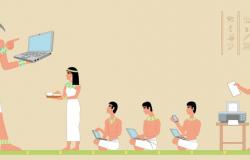During the Stellantis general meeting on April 16, the vote in favor of compensation for CEO Carlos Tavares of up to 36.5 million euros in 2023, aroused the indignation of many stakeholders, who have been described as “indecent”.
Indecency, a term omnipresent today in debates concerning the behavior of economic leaders, seems to merit an attempt at a definition, which, as it stands, remains vague and uncertain. However, this word seems to us to open up important perspectives and avenues of reflection, particularly in relation to Orwellian “common decency” which promotes an ethics of (ordinary) virtues, in an attempt to respond to the current leadership crisis.
For this, a detour through the thought of George Orwell is necessary. The author of 1984 indeed stated this:
“What scares me… is their inability to realize that human society needs as its foundation the values of common decency, whatever political or economic form it uses. »
Although Orwell never explicitly theorized his notion of “common decency,” he used it so often and explicitly that it became a central part of his intellectual legacy.
Ordinary decency according to Orwell
Orwell maintained that respect for all, including the most disadvantaged among “common people,” is the foundation of decent behavior and involves reducing the most shocking inequalities. He also wanted to highlight the distance of the elites from the reality of “simple people” with the corollary of forgetting ordinary decency. “Common decency” can then be interpreted as an ability to differentiate between good and bad, a form of moral accuracy, as Bruce Boût develops in his essay On Ordinary Decency. It encompasses qualities such as justice, humanity, humility and mutual support. And attempts to give a bold response to what must sometimes be called the vulgarity of certain elites.
At the beginning of his work, George Orwell also believed that only the working class was capable of common decency. Over time, he extended the notion to employees but not to privileged people whose lifestyle, the disconnection with the reality of the living conditions of the most modest and the “power” that they have in their hands made it impossible to preservation of this decency acquired through experience. Several authors subsequently summarized decency as the absence of humiliation. This is, for example, the case of Avishai Margalit (The decent society, 1999) which defines a decent society as one whose institutions do not humiliate people. The philosopher Bruce Boût, who studied the English author, also explains that “that which does not humiliate the individual” is decent.
Finally, let us note that if respect for others is a central notion of common decency, it is not limited to non-humiliation. Common decency is intended to be broader and also refers to other virtues such as justice, equality, humanity and solidarity. Common decency values the virtues that allow us to respect others enough so that they do not feel humiliated, but fairly considered.
Contemporary indecency
In fact, by examining the way in which indecency is perceived, we quickly see that executive remuneration deemed excessive is often the source of indignation. Exorbitant salaries, golden parachutes, social benefits, retirement benefits; These facts revolt employees, unions, journalists as much as society as a whole. What is outrageous here is not the absolute amount, but the dizzying gap with employee salaries (often 400 times lower). The question of the much-vaunted meritocracy then arises.
It should be noted from the outset that other forms of indecency are taking shape: we could think of FIFA and its president Gianni Infantino, who embellished the reality regarding the working conditions of construction workers in Qatar during the preparations for the 2022 World Cup, refused to pay compensation to the injured and the families of deceased workers, while “pocketing billions of dollars” according to Human Rights Watch. Gianni Infantino’s explanations met with a unanimous response in the French press, accusing him of both indecency and cynicism.
Accusations of indecency, even more recent, reveal key aspects of the evolution of this notion: the powerful are increasingly denounced for mortgaging the future of future generations. The irresponsibility of certain business leaders towards the environment, the lobbying against ecological regulations in favor of fossil fuels, as well as their lifestyle with high carbon emissions, are all proof of indecency that denounce observers of all kinds. It was as if a new emotional reality seemed to have exacerbated the feeling of social and environmental injustice, transforming inequality into a personal and intimate experience. And it is in this context that the notion of indecency has gradually acquired new importance, referring to the shared feeling of degradation and denial of dignity. Because, most often, contempt, humiliation and indignation are intertwined in the condemnation of indecency.
Hubris or indecent leadership
By broadening the analysis, we can establish a link between indecency and another behavior widely discussed in the media, especially after the 2008 financial crisis, thehubris. This pathology of the ego has been extensively studied in management and economics research, since the publication in 1986 of Richard Roll’s founding research paper “The hubris hypothesis of corporate takeovers”, even if the notion dates back to ancient Greece. . Icarus is one of its oldest representatives, flying too close to the sun, and forgetting his condition and his human limits. L’hubris is defined by an exaggerated perception of oneself, the conviction of being above other humans, a certain distance from reality too, combined with an impermeability to criticism.
Every Monday, whether you are managers looking for strategies or employees wondering about the choices of their hierarchy, receive in your mailbox the keys to research for professional life and advice from our experts in our thematic newsletter “Business (s)”.
Subscribe today
However, the indecent CEO is precisely the one who has an exaggerated opinion of his/her merits and his/her rights, he/she is disconnected from people’s reality, and can then seem to demonstrate an absence of compassion and interest in others. Indecency then becomes a sort of manifestation, a symptom ofhubris.
Also read: “Chief truth officer”: speaking the truth and leadership
Because we can consider that decency constitutes a condition of possibility for ethical leadership. The notion of decency certainly implies a modest ambition (and yet even modest, it is often lacking today). Decency does not represent an integral level of excellence or a quest for absolute perfection in leadership, but simply the adoption of acceptable and appropriate behavior. Here it is not the “grandiosity of leadership” that prevails but rather the recognition of the vulnerable nature of our condition, human and environmental. For the attention of the Duke of Chevreuse, in a short educational treatise intended for young people soon to be holders of power, the philosopher Blaise Pascal did not already warn that “all the outbursts, all the violence and all the vanity of the great come from the fact that they do not know what they are”? This sentence even constituting the conclusion of his 1er speech on the Condition of the Great_.
Taking vulnerability into account
So much so that it seems essential today that economic leaders, just like politicians, become more aware of a certain vulnerability of the human condition, and thereby of their own situation. The virtue of humility (in response to humiliations), not polite or strategic humility, that of false modesty, could help them, in order to develop the desire, at the heart of any management worthy of the name, to serve something something, a cause – or a project – bigger than themselves.
However, “true humility,” wrote Bernanos in the Dialogue of the Carmelites, “is first and foremost decency.” This, especially since the XXIe century confronts us with challenges that require leaders endowed with some moral virtues: creating or maintaining economic development in a world with limited resources constitutes a challenge very different from that to which we have been accustomed in a world where resources were considered infinite . Environmental collapse and the resulting societal crises will call upon virtues such as prudence, temperance, and the courage to speak the truth. All of these virtues will be necessary to face the extreme leadership situations that await us. Let us therefore conclude with prudence and temperance, virtues as rare as they are ordinary. Virtues which refer, ultimately, to the right measure, to an optimal balance, to what the ancient Greeks called the “metron”. The concern for the right proportion, the culture of a harmonious relationship between quantity and quality, in short, the complete opposite ofhubris.






